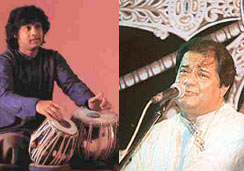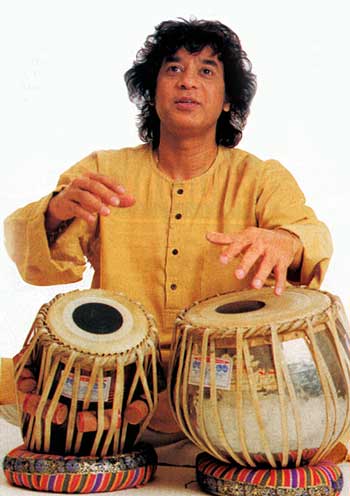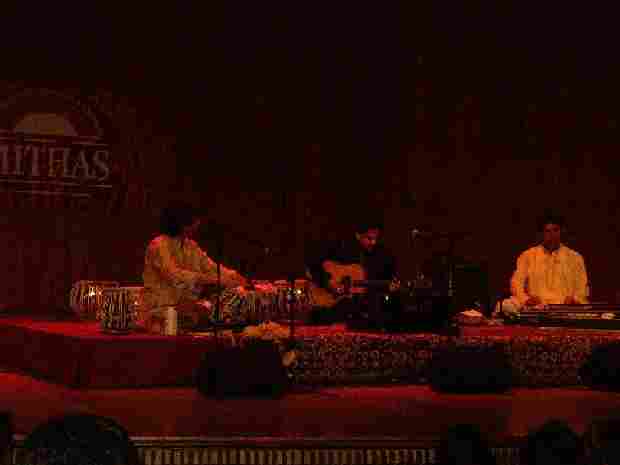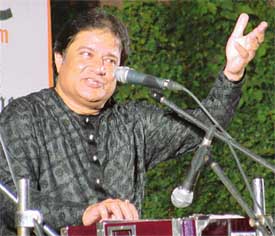Contribute
| Maestros In Concert - Zakir Hussein And Anup Jalota Wow Boston |
Chitra Parayath
04/04/2005
On Sunday, March 27, MITHAS presented a unique concert featuring two musical maestros: tabla Ustad Zakir Hussein and popular bhajan and ghazal exponent Anup Jalota together for the first time, in Boston.
MITHAS Chairperson Deepti Nijhawan opened the evening’s proceedings with a quote from Suchita Rao’s article on Lokvani: “In the present times, artists feel compelled to present their best tricks in the shortest amount of time. Yet, when Uday Bhawalkar opened his Dhrupad concert with Raga Bhimpalaas and sang it for over two hours on March 13, 2005 at MIT’s Wong auditorium, he held the audience spellbound.”
She went on to reiterate MITHAS’s commitment to the arts of South Asia and it’s dedication to the propagation and preservation of these arts.
George Ruckert in his introduction to the two maestros Zakir Hussein and Anup Jalota said it all of this distinctive duo. Of Hussein, he said, “the man without Boundaries. No nation or region can claim him”, and of Jalota “ the Singer who has more Platinum album sales to his name than the Beatles or Elvis”
Zakir Hussein, no stranger to these shores (he plays in Boston every year), nevertheless, had an eager crowd cheering and welcoming him.
Hussein opened with an introductory speech, “ Music has its roots in divinity … the repertoire of our drums come Shiva.” he informed the audience hanging on to every word and pada on the tabla.
Hussein’s solos on the tabla were often interrupted by applause from an appreciative audience. Few can match his electrifying presence on stage.
Hussien’s performance is all motion, his shoulder’s twitch, and his face crunches in the ecstasy of musical concentration. He seems to be channeling his father, the late great Ustaad Allah Rakha, during his long solos.
His hands fly over the tabla, caressing, pounding, a cascade of rhythms rushing towards a stunning crescendo. Each piece received generous applause from the audience.
With stops along the way to joke and educate the audience about the different ragas and Padas, he proves to be the absolute entertainer, one who is eminently watchable. He had the crowd in splits most of the time, with jibes about everything, from the chaotic traffic conditions in India to the art of tuning instruments.
The second half of the program had Anup Jalota open with his trademark Bhajan “Aisi laagi lagan, Meera ho gayi magan, wo to gali gali Hari gun gaane lagi (in keerwani)” with stylistic variations that sat well with the audience.
Weaving seamlessly between bhajans and ghazals, he followed the Meera bai bhajan with the love ballad “ Chaand angdaiyaan leh raha hai”. ‘Tere mann me Raam tann mein Ram,’ another signature Jalota bhajan followed, rendered in his inimitable style. His tonal range and ability to tackle the most complicated of ragas with utmost ease was amazing proving that melody and modulation are his forte.
He switched soon after to sing a medley of popular Bollywood songs, which included ‘Tum itna jo muskura rahe ho’ and ‘Chaudhaveen ka chaand.’
He even got the house to sing along ‘Honthon se choo lo tum’ in remarkable unison and pitch at that, along with him.
This reviewers’ favorite ‘Lal meri pat’, brought the roof down with the audience going wild and chanting Duma Dum Mast Kalander in tandem with the tablas. Jalota kept the audience engaged with his good-natured ribbing of the tabla, banjo and guitar players accompanying him. Ramesh Kumar on tabla, Basheer Ahnmed on banjo and Robert on guitar all performed creditably.
The final segment of the concert had the two maestros together. Hussein and Jalota complemented each other’s style with flair and élan; their jugalbandi was easily the highlight of the evening.
Mr. Rajaram Narayanaswamy and Mr. Raj Alur gave short overviews of MITHAS’s membership drives and announced the new ‘Endowment program.’
Dr. Puran Dang, outgoing Chairman and long time supporter of MITHAS was presented with a token of appreciation by the members of MITHAS.
You may also access this article through our web-site http://www.lokvani.com/



